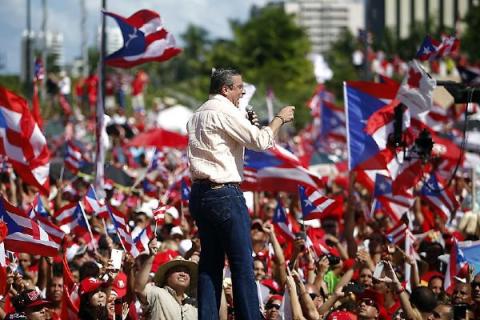While states throughout the nation passed reforms and enacted new laws on Tuesday, the people of Puerto Rico voted on whether they would like to seek statehood. The island passed a two-part referendum, with 54 percent of the island affirming they would like to change their 114-year relationship with the United States, which began after the Spanish-American war, and potentially become the 51st state.
The unincorporated US territory has granted residents American citizenship since 1917. However, citizens residing in Puerto Rico are not residents of a state or the District of Columbia, disqualifying them from voting in the federal elections and do not enjoy the full range of rights guaranteed by the US constitution. Instead, only the fundamental rights recognized under the constitution are applicable to the people who live in Puerto Rico.The second part of the referendum revealed the overwhelming desire for Puerto Rican statehood. 61 percent of Puerto Rican voters chose to support the change, while 33 percent voting to retain their autonomy, and only a small percentage, 5, choosing to throw their support behind independence. Surprisingly, however, the island chose not to re-elect the pro-statehood governor, Luis Fortuno of the New Progressive party. Instead, Alejandro Garcia Padilla won the bid in the gubernatorial race. Garcia is a member of the Popular Democratic Party which favors Puerto Rico's current status as part of the semi-autonomous US commonwealth.
What Statehood Would Mean for Puerto Rico & the United States
This majority vote for statehood represents a huge shift in the mentality of the island, which had voted to retain its status as a US territory with overwhelming majorities in 1967, 1993, and 1998. However, before Puerto Rico can be admitted into the union both houses of Congress would have to pass an act of admission with a simple majority. On top of this, the president would have to sign the act, affirming the newly minted status as a state of the Union. Fortunately, for pro-statehood constituency of Puerto Rico, President Obama has declared his support for the territory's bid.
If admitted Puerto Rico stands to gain $20 billion a year in federal funds, as well as two seats in the Senate and five seats in the House. Currently, their representation at the capital consists of a single Resident Commissioner.
As a U.S. commonwealth, Puerto Rico does not pay federal income taxes, and businesses on the island are exempt from corporation tax. Both of these would provide extra revenue for the federal government. However, according to the 2010 census, Puerto Rico would become the poorest state in the nation with a personal income per capita of $14,237. In contrast, the nation's current poorest state is Mississippi whose personal income per capita is $30,399, with only 43 percent of the state paying the federal income tax. Additionally, if Puerto Rican statehood was granted, the five seats in the House of Representatives would either have to be subtracted from existing states or be added to the total number of representatives (at least until the next census).
“The ball is now in Congress’ court and Congress will have to react to this result... this is a clear result that says ‘no’ to the current status.” - Pedro Pierluisi
Regardless, the historical decision is now up to the newly elected US Congress. As stated by the current Resident Commissioner, Pedro Pierluisi.
